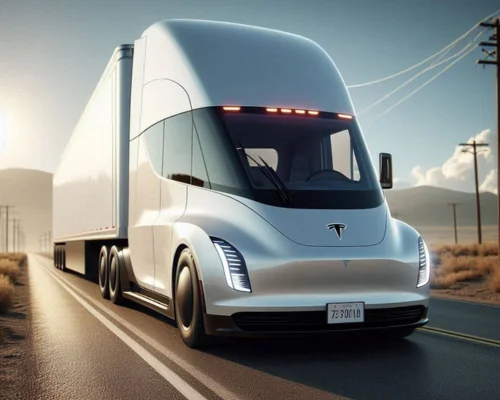Future of Freight Trucking: 7 Signs Electric Is On The Rise
The heavy-duty electric truck is one of the most powerful technologies in freight trucking, and it is being developed, tested, and put on the road today.
As you can imagine, developing the technology that goes into making an electric version of a tractor-trailer is a little more challenging than it is for a Toyota Prius or any other electric or hybrid passenger car. But here are 7 signs that the future of freight trucking is electric.

7. Most Freight Trucking Tonnage Is Shipped on Short Hauls
One of the main concerns about relying on electricity for the future of freight trucking has been the limited range of electric trucks and the lack of recharging infrastructure. In 2019 the North American Council on Freight Efficiency (NACFE) issued a guidance report calling for a “return to base” strategy for electric trucks. In other words, fleets using electric trucks should charge them at their home locations only and not expect them to recharge on the road.
This won’t be a problem for most trucks. The US Department of Transportation reported that in 2018, more than two-thirds (7.3 billion tons) of the 11.1 tons of freight shipped by trucks in the United States were sent less than 100 miles. Another 1.8 billion tons were shipped 100-249 miles.
So, limited range won’t be a factor for most trucks, and electric powertrains are being developed that will allow trucks to travel 400 miles or more.
6. Daimler AG and Volvo Group Have Formed A Fuel Cell Joint Venture
In April 2020, two major trucking manufacturing competitors, Daimler AG and Volvo Group, joined forces to accelerate the development and use of fuel cells for electric trucks and other applications. To date, most attention regarding how to power heavy-duty electric trucks has been on batteries. Fuel cells offer a more sophisticated and greener way to generate power.
The level of cooperation between competitive industry giants is unprecedented.
5. Honda and Isuzu Join Forces on Fuel Cells
Three months before Daimler AG and Volvo Group announced they were working together on fuel cell technology, Japanese commercial vehicle manufacturers Honda and Isuzu announced they would conduct joint research on fuel-cell-powered heavy-duty trucks. This marks the first time Honda will make its fuel cell expertise available to another company.
As stated in a joint release, “Isuzu has been striving to promote the utilization of low-carbon and sustainable energy. To that end, Isuzu has been researching and developing various powertrains including clean diesel engine, engines for natural gas vehicles (NGVs) and electric vehicle (EV) powertrains, which accommodate a broad range of customer needs and how vehicles are used. In parallel, Honda has been working toward the realization of a carbon-free society and, to this end, in addition to hybrid and battery electric vehicles, Honda has been researching and developing fuel cell vehicles (FCVs), the ultimate environmental technology, for more than 30 years.”
4. Volkswagen AG Truck Division Commits $2.2 Billion to Electric Vehicles
Traton, Volkswagen AG’s truck division, will up its spending on electric vehicles and digital offerings by 2 billion euros over the next five years.
“The reduction of CO2 emissions is probably the biggest challenge for mankind, our industry, for our customers — for every one of us,” Traton chief Andreas Renschler said, according to FleetOwner. “It affects a huge, complex ecosystem, and transport is a core element of that.”
3. Volvo to Roll Out Heavy-Duty Electric Battery Trucks
Volvo Trucks North America is slated to roll out its new VNR Electric line of battery-electric Class 8 trucks in 2020 and 2021. Class 8 trucks are heavy trucks that weigh upwards of 33,000 pounds. The trucks will be rolled out regionally to enable Volvo to prepare for a service network. California will be the first region to receive them.
2. Canada’s Largest Grocery Chain Commits to Electric Trucks
Loblaw, Canada’s largest grocer, has set a corporate goal to reduce its 2030 greenhouse gas emissions by at least 30 percent compared to 2011. To ensure that, Loblaw has jumped deep into the electric truck market, preordering Tesla Semis before production dates were announced. It’s also exploring the possibility of making preproduction orders with Freightliner and BYD.
1. Navistar Is in Electric Trucks for the Long Haul
During many questions about what kind of incentives might be available for electric trucks, Navistar is not waiting to find out. They aim to build electric trucks that are priced competitively with diesel trucks. Navistar representatives say they don’t want to find themselves in a tough spot when the incentives go away because that’s when investment typically stops.
“We’re in this for the long haul,” Jason Gies, Director of Navistar’s eMobility business development, told FreightWaves. “We’re not just chasing grant money in the short term. Our goal is to electrify everything that makes sense.”
Tackle the Future of Freight Trucking with FreightCenter
These seven are just some signs of the new future of freight trucking. The days of diesel smell and loud engine noises will soon be over, as industry leaders are working towards making freight trucking electric to remedy environmental and economic challenges.
When you’re ready to ship, FreightCenter is here to help you with free online quotes and an in-house staff of shipping experts you can reach at 800.716.7068.

